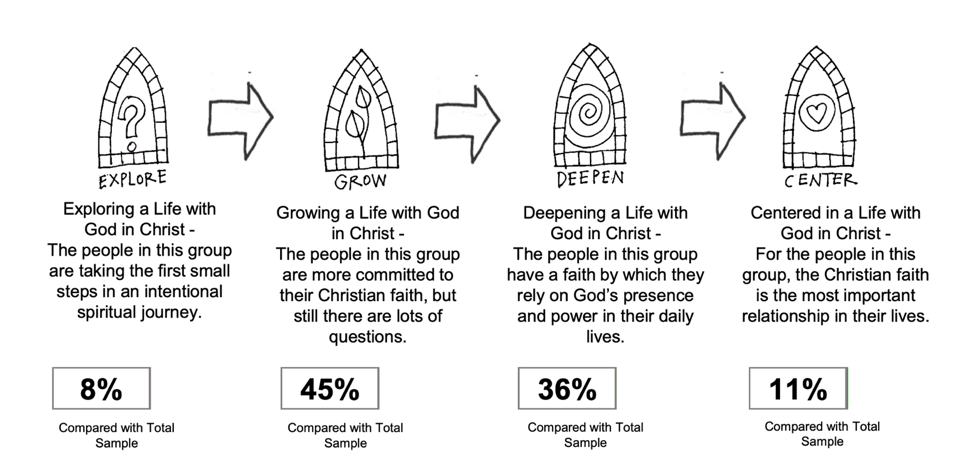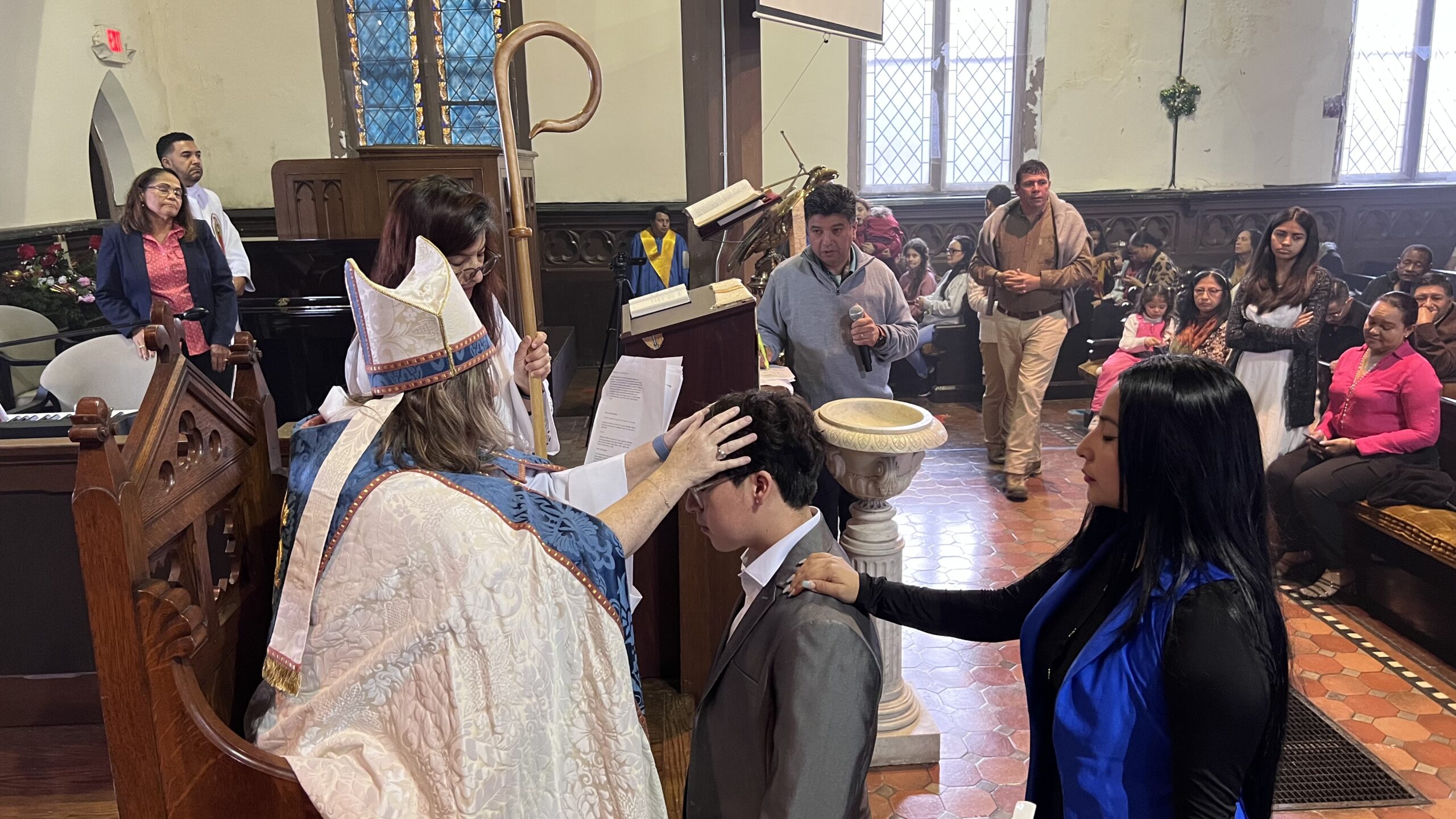Learnings from the My Way of Love Inventory
The Rev. Emily Mellott provide a brief overview of the “My Way of Life” spiritual inventory results for the diocese
This past Fall, our bishop and the Discerning Our Common Call Commission of the Diocese of New Jersey asked diocesan leaders and members of congregations throughout the diocese to participate in a spiritual inventory called My Way of Love. Its goal was to give us a broader understanding of where we are in our formation as disciples of Jesus Christ and in carrying out God’s mission of reconciliation in the world. The survey asked us to reflect on our beliefs and spiritual practices—how our relationship with God shapes our life. Nearly 800 people responded.

The My Way of Love inventory results give us a snapshot of our journey as disciples of Jesus—exploring, growing, deepening, and centering in our relationship with Jesus. RenewalWorks, a ministry of Forward Movement, assessed our responses and compared them with a database of 2,000 churches and 43,000 respondents from congregations across all US denominations, including more than 350 churches and 23,000 respondents from congregations in The Episcopal Church.
The results show that across the board, respondents from the Diocese of New Jersey are more likely to have a deeper or centered relationship with Christ than respondents in comparable Episcopal churches. This is a positive reflection on our diocesan focus on developing disciples, and gives us much to celebrate.
The My Way of Love inventory report shows:
- Strength in the deeper phases of discipleship among respondents in our diocese.
- We are a diocese of “do-ers,” who are especially strong in faithful service in our local communities.
- We rely on the core practices of our worship and Episcopal identity to support our discipleship.
- We have opportunities to use our service ministry and our daily prayer practices to strengthen our trust in the core teachings of our faith.
- There are many more opportunities to grow and deepen discipleship.
Spiritual Continuum
Compared with other Episcopalians, respondents in our diocese are significantly more likely to rely on God’s presence and power in our lives, to trust Jesus as a guide for decisions and actions day-to-day, and to see Christ as the most important relationship in our lives. This is the core of our common call to form a deep relationship with Jesus. The responses to the My Way of Love project suggest that we in the Diocese of New Jersey have been doing that work well.
There’s still room to grow, of course. Forty-five percent of respondents find themselves in the stage of our spiritual journey where we’ve have not yet learned to rely on our deep trust in Jesus in daily life, and we are still growing in or developing the practices that make faith central in daily life. Many others of us are in the early stages of exploring a relationship with Jesus and learning what we truly believe. This compares well with the RenewalWorks database, in which more than 70 percent of Episcopal respondents are in these two stages of relationship with God, and also suggests that we can, as a diocese, continue to grow stronger and closer in our relationships with Jesus.
 Compared with members of other denominations across the US, the Diocese of New Jersey is closer to the average distribution of phases of discipleship. Where we vary noticeably from the average—in the responses of people in the deeper and more centered phases of discipleship—may in part reflect some cultural differences in the ways Episcopalians and members of other denominations commonly teach the goals of our discipleship. (We are, perhaps, less likely to say that the pinnacle of our faith is when we ask Jesus to “take the wheel.”)
Compared with members of other denominations across the US, the Diocese of New Jersey is closer to the average distribution of phases of discipleship. Where we vary noticeably from the average—in the responses of people in the deeper and more centered phases of discipleship—may in part reflect some cultural differences in the ways Episcopalians and members of other denominations commonly teach the goals of our discipleship. (We are, perhaps, less likely to say that the pinnacle of our faith is when we ask Jesus to “take the wheel.”)
Beliefs and practices
Respondents in the Diocese of New Jersey generally indicate that the practices and teachings centered in our worship—Eucharist and prayer, the Baptismal Covenant and Creeds, and our relationship with The Book of Common Prayer—are especially important in the daily living of our faith. Our response in these areas is strong compared with other respondents in the Episcopal Church and (where applicable) across all denominations.
This suggests that the practices of our worship are a strong resource for our continued growth, deepening our relationship with Jesus. We can “go where the energy is” by using the practices of our worship to help us focus on our common call of deepening and strengthening discipleship.
We are also noticeably strong in and committed to the practice of “serving” with our faith—giving our time and using our spiritual gifts to help and serve others—and to sharing our faith. Our responses to questions and statements about these ways of practicing our faith and relationship to Jesus appear above average across the RenewalWorks databases. As a diocese, we appear to be “do-ers,” ready to go outside the walls of the congregation with our faith, and to live out our faith with our “hands”—physical and metaphorical.
Our My Way of Love responses also indicate that we rely a lot less on the strength of our beliefs. Our understanding of the Trinity, sense of the authority of scripture, of God’s personal engagement with our lives, and our understanding of our fundamental purpose in relationship to God are significantly less strongly held in our diocese than across respondents of all denominations, and roughly average for Episcopal respondents.
This presents us with an opportunity to strengthen our faith and relationship with Jesus by starting from what we do well—the exercise of our hands, time, and talent, in the service of God’s people—to help us reflect on and grow stronger in the core beliefs that both sustain those practices and help us trust more deeply in God and grow closer to Jesus in our discipleship. Action/reflection tools that engage questions of how we see God in the service work we are doing may be very useful in the next stages of our shared growth in the diocese.
Respondents in the Diocese of New Jersey show a higher-than-average inclination among Episcopal respondents toward the personal spiritual practices that strengthen discipleship, including daily scripture reading and reflection, daily use of The Book of Common Prayer and prayer practices including intercession, confession, thanksgiving, and seeking God’s guidance. We generally reflect average or above-average levels of engagement in these practices compared to respondents from across all denominations.
This is a strong sign for our continued growth in discipleship, and suggests that an opportunity to strengthen our commitments to, and trust in, the core beliefs and teachings of our faith can come from capitalizing on regular prayer, reading, and reflection.
What’s next?
In the weeks to come, members of the Lifelong Christian Formation Committee, the Discerning our Common Call Committee, and the bishop’s staff will be considering ways to use our learnings from this project to strengthen our shared purpose in the Diocese of New Jersey: To form people as disciples of Jesus Christ so they can carry out God’s mission of reconciliation in the world.
Many thanks to all who participated in this survey, and who encouraged others to participate, to build a picture of where we are, together, in our ministry and growth as disciples of Jesus.







